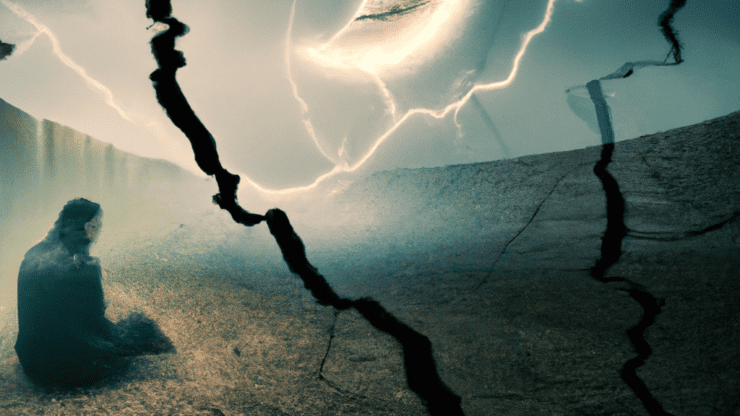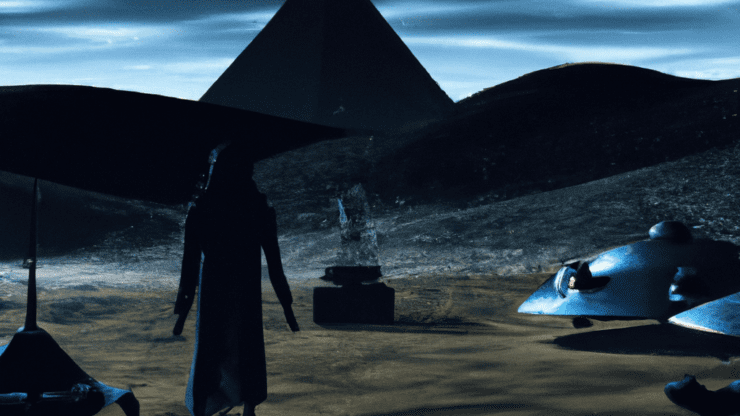As humans, we have always found fascination in the unknown. Perhaps nothing is more unknown or mysterious than the possibility of extra-terrestrial life.
For centuries, we have explored this topic in literature, and the significance of these encounters cannot be understated.
In this article, we’ll delve into the evolution of extra-terrestrial encounters in literature, examine why they matter, and explore their role in science fiction.
We’ll also take a look at common misconceptions and myths and discuss the future of extra-terrestrial encounters in literature.
Jump to Section
The Evolution of Extra-Terrestrial Encounters in Literature
The earliest portrayals of extra-terrestrial encounters in literature
Extra-terrestrial encounters have been explored in literature for centuries, but it wasn’t until the 19th century that they became more prevalent.
In 1865, Jules Verne’s "From the Earth to the Moon" captivated readers with its portrayal of a moon landing. H.G. Wells’ "The War of the Worlds" followed in 1898, introducing the idea of extra-terrestrial invasion.
These early portrayals set the stage for the plethora of literature on extra-terrestrial encounters that followed.
How have extra-terrestrial encounters evolved over time?
Over time, extra-terrestrial encounters have become more complex and varied. They have evolved from simple portrayals of aliens as one-dimensional creatures to complex and multi-dimensional beings with their own cultures and societies.
This evolution has been influenced by cultural, social, and technological changes, as well as scientific advancements.
Impact of cultural, social, and technological changes on extra-terrestrial encounters in literature
Cultural and social changes have played a significant role in the portrayal of extra-terrestrial encounters in literature.
For example, the Cold War and subsequent space race led to an increase in literature exploring the possibility of extra-terrestrial life and conflict with other worlds.
Advancements in technology have also influenced the portrayal of extra-terrestrial encounters, allowing for more detailed and realistic depictions.
Why Do Extra-Terrestrial Encounters Matter?
Examining the societal implications of extra-terrestrial encounters in literature
Extra-terrestrial encounters in literature can have a profound impact on society. They can reflect societal fears, hopes, and anxieties, and can even influence public opinion on topics like space exploration and extraterrestrial life.
They can also help us explore our own culture and values, as well as those of others.
Analyzing the psychological effects of extra-terrestrial encounters on readers
Extra-terrestrial encounters in literature can also have a significant psychological impact on readers. They can induce feelings of wonder, fear, and even existential dread.
They can challenge our beliefs and perceptions about the universe and our place in it.
How literature helps us understand the impact of extra-terrestrial encounters on humanity
Literature on extra-terrestrial encounters can help us understand the potential impact of these encounters on humanity.
It can help us explore the ethics and implications of contact with intelligent life, as well as the potential benefits and dangers.
The Role of Extra-Terrestrial Encounters in Science Fiction
How science fiction explores the possibilities of extra-terrestrial encounters
Science fiction has played a significant role in exploring the possibilities of extra-terrestrial encounters. It allows us to imagine different scenarios and explore the consequences of contact with intelligent life.
The influence of science fiction on scientific research and development
Science fiction has also influenced scientific research and development. For example, the concept of space travel and the exploration of other worlds has been influenced by science fiction depictions of extra-terrestrial encounters.
Examples of popular science fiction works that explore extra-terrestrial encounters
There are countless science fiction works that explore extra-terrestrial encounters, from classic novels like "Childhood’s End" by Arthur C. Clarke to modern TV shows like "Stranger Things." These works allow us to explore different possibilities and scenarios.
Debunking Myths and Misconceptions About Extra-Terrestrial Encounters
Popular misconceptions and myths about extra-terrestrial encounters
There are many misconceptions and myths surrounding extra-terrestrial encounters, from the idea that aliens are always hostile to the notion that they are humanoid in appearance.
These misconceptions can be damaging and limit our ability to imagine and explore different possibilities.
Separating fact from fiction: what we know and don’t know about extra-terrestrial encounters
While there is still much we don’t know about extra-terrestrial life, there are some facts that have been established through scientific research.
For example, we know that there are potentially habitable planets in our own galaxy, and that life may exist in extreme environments.
The role of literature in shaping our perceptions of extra-terrestrial encounters
Literature plays a significant role in shaping our perceptions of extra-terrestrial encounters. It allows us to explore different possibilities and scenarios and can influence the way we think about life beyond our own planet.
The Future of Extra-Terrestrial Encounters in Literature
Predictions for the future of extra-terrestrial encounters in literature
As technology continues to advance, the possibilities for extra-terrestrial encounters in literature will continue to expand.
We may see more depictions of complex and multi-dimensional alien societies, as well as more exploration of the potential implications of contact with intelligent life.
The impact of advancements in technology on the portrayal of extra-terrestrial encounters in literature
Advancements in technology will also impact the portrayal of extra-terrestrial encounters in literature. For example, virtual reality may allow readers to immerse themselves in extra-terrestrial environments and interact with alien life in new and exciting ways.
The potential for literature to influence societal beliefs and attitudes towards extra-terrestrial encounters
Literature on extra-terrestrial encounters has the potential to influence societal beliefs and attitudes towards the possibility of intelligent life beyond our own planet.
It can help us explore our own values and beliefs, as well as those of others.
Exploring Extra-Terrestrial Encounters in Literature: Why They Matter
Extra-terrestrial encounters in literature are more than just entertaining stories. They allow us to explore the unknown and challenge our own beliefs and perceptions.
They offer insights into societal fears, hopes, and anxieties, as well as our own culture and values. As technology continues to advance, the possibilities for exploring these encounters in literature will continue to expand.
The future holds exciting possibilities for literature on extra-terrestrial encounters, and it’s up to us to explore them.
FAQ
What are some examples of literature that explore extra-terrestrial encounters?
There are countless examples of literature that explore extra-terrestrial encounters, from classic novels like "The War of the Worlds" by H.G. Wells to modern works like "Arrival" by Ted Chiang.
What impact can extra-terrestrial encounters in literature have on society?
Extra-terrestrial encounters in literature can reflect societal fears, hopes, and anxieties, and can even influence public opinion on topics like space exploration and extraterrestrial life.
They can also help us explore our own culture and values, as well as those of others.
What role does science fiction play in exploring extra-terrestrial encounters?
Science fiction allows us to imagine different scenarios and explore the consequences of contact with intelligent life.
Greetings fellow space travelers, I am Draco Blaze, creator of Alienated Media who is passionate about exploring the unknown and writing about my experiences with extraterrestrial life.
My focus is on alien encounters and creating thought-provoking sci-fi short stories that transport readers to new worlds and realities.
Feel free to contact me at [email protected].





